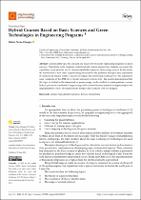| dc.contributor.author | Nieto-Chaupis, Huber | |
| dc.date.accessioned | 2023-12-20T20:43:46Z | |
| dc.date.available | 2023-12-20T20:43:46Z | |
| dc.date.issued | 2023 | |
| dc.identifier.uri | https://hdl.handle.net/20.500.13067/2886 | |
| dc.description.abstract | An ineluctable topic has emerged and needs to be treated in engineering programs for green energies. Particularly in the programs of electrical and systems engineering, students can acquire the capabilities to envision the arrival of green standards to generate clean energy sources. In this article, the introduction of new forms of green energy is systematically presented through a basic experiment in electricity in which a potato is used to investigate the current and electric power. The experiences were conducted at the 2022-I at a private university in Lima City. The results demonstrated that the topic of biofuel in the framework of green energy can be studied in undergraduate courses. Indeed, prospective students of engineering can be oriented toward research in engineering for the implementation of new electrical systems that provide electricity with low budgets. | es_PE |
| dc.format | application/pdf | es_PE |
| dc.language.iso | eng | es_PE |
| dc.publisher | MDPI | es_PE |
| dc.rights | info:eu-repo/semantics/openAccess | es_PE |
| dc.rights.uri | https://creativecommons.org/licenses/by/4.0/ | es_PE |
| dc.subject | Engineering education | es_PE |
| dc.subject | Physics | es_PE |
| dc.subject | Devices and systems | es_PE |
| dc.title | Hybrid Courses Based on Basic Sciences and Green Technologies in Engineering Programs | es_PE |
| dc.type | info:eu-repo/semantics/article | es_PE |
| dc.identifier.journal | Engineering proceedings | es_PE |
| dc.identifier.doi | https://doi.org/10.3390/engproc2023038049 | |
| dc.subject.ocde | https://purl.org/pe-repo/ocde/ford#2.02.04 | es_PE |
| dc.source.volume | 38 | es_PE |
| dc.source.issue | 1 | es_PE |
| dc.source.beginpage | 1 | es_PE |
| dc.source.endpage | 8 | es_PE |


